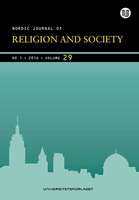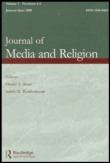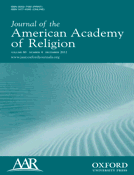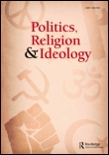
JOURNAL OF CHURCH AND STATE
Scope & Guideline
Illuminating the Dynamics of Church and State
Introduction
Aims and Scopes
- Interplay between Religion and Politics:
The journal extensively examines how religious beliefs and institutions interact with political systems, shaping governance, policy-making, and civil rights. - Historical Perspectives on Church-State Relations:
Focusing on historical contexts, the journal analyzes the evolution of church-state dynamics, including significant events, movements, and figures that have influenced modern governance. - Religious Freedom and Human Rights:
A core focus is on the implications of religious freedom for human rights, exploring legal frameworks, case studies, and the impact of religion on marginalized communities. - Global and Comparative Studies:
The journal publishes comparative analyses of church-state relations across different countries and cultures, highlighting unique challenges and solutions in diverse contexts. - The Role of Religion in Social Movements:
It investigates how religious communities mobilize for social change, addressing issues such as justice, equality, and political activism. - Secularism and Pluralism:
The journal addresses the challenges and opportunities presented by secularism and religious pluralism in contemporary societies, debating their roles in public life.
Trending and Emerging
- Religious Nationalism:
There is a growing focus on the rise of religious nationalism, particularly in relation to political movements and policies that intertwine national identity with religious ideologies. - Impact of COVID-19 on Religious Practices:
Recent publications increasingly explore how the COVID-19 pandemic has affected religious practices, freedoms, and the legal responses of states, reflecting a timely and relevant discourse. - Intersectionality in Religion and Politics:
Emerging themes highlight the intersectionality of religion with race, gender, and socio-economic issues, emphasizing how these factors influence church-state dynamics. - Digital Religion and Online Communities:
The rise of digital platforms for religious expression and community-building is gaining attention, reflecting changes in how faith is practiced and organized in the contemporary world. - Environmental Justice and Faith-Based Activism:
An increasing number of articles discuss the role of faith-based organizations in environmental activism, linking religious motivations to ecological and social justice movements.
Declining or Waning
- Traditional Religious Authorities:
There is a noticeable decrease in papers focusing on the authority of traditional religious institutions, possibly indicating a shift towards examining grassroots movements and alternative spiritualities. - Interfaith Dialogues:
Themes centered on interfaith dialogues have become less frequent, suggesting a potential waning interest in cooperative religious efforts in favor of more contentious political analyses. - Historical Narratives of Religious Conflicts:
Research focusing on historical narratives of religious conflicts, particularly those that emphasize divisive aspects, seems to be less prevalent, reflecting a move towards reconciliation and collaborative studies. - Theological Foundations of Politics:
Papers that strictly analyze the theological underpinnings of political ideologies have decreased, indicating a shift towards empirical and sociological approaches over purely doctrinal discussions. - Religion and Economic Systems:
There appears to be a reduction in discussions linking religion directly to economic models, which may have been overshadowed by more pressing contemporary issues related to politics and identity.
Similar Journals

Journal of Religion and Popular Culture
Exploring the Intersections of Faith and CultureJournal of Religion and Popular Culture is a unique academic platform dedicated to the exploration and analysis of the intricate relationships between religious practices and popular culture. Published by University of Toronto Press, Inc., this journal provides a critical forum for scholarly discourse, appealing to researchers, students, and professionals in the fields of Cultural Studies and Religious Studies. Since its inception in 2013, the journal has established itself as a significant contributor to the academic community, evidenced by its current category quartiles: Q4 in Cultural Studies and Q3 in Religious Studies as of 2023, alongside its Scopus rankings. Although it operates on a subscription basis, the journal's accessibility enhances its reach within the scholarly community. With a focus on fostering interdisciplinary dialogue, the Journal of Religion and Popular Culture invites contributions that illuminate the dynamic interplay between faith and the vibrant expressions of popular culture, making it a vital resource for understanding contemporary societal trends.

Nordic Journal of Religion and Society
Exploring the Intersection of Faith and Society in the Nordic ContextThe Nordic Journal of Religion and Society is a leading academic journal dedicated to the interdisciplinary study of religion within societal contexts, published by Scandinavian University Press - Universitetsforlaget AS. With its ISSN 0809-7291 and E-ISSN 1890-7008, this journal proudly occupies a significant position in the field, reflected by its Q2 ranking in Religious Studies (2023) and a commendable Scopus percentile of 77, ranking 147 out of 644 in its category. The Nordic Journal of Religion and Society aims to publish high-quality, original research that explores how religious beliefs and practices intersect with societal transformations across the Nordic context. The journal emphasizes the importance of diverse methodological approaches and theoretical frameworks, fostering scholarly dialogue that enhances understanding of contemporary socio-religious phenomena. Though it operates under a subscription model, the journal’s commitment to academic excellence makes it an essential resource for researchers, professionals, and students keen on advancing knowledge within this dynamic and evolving field.

Politics and Religion Journal
Unveiling the Dynamics of Belief and PowerPolitics and Religion Journal, published by the CENTER STUDY RELIGION & RELIGIOUS TOLERANCE in Serbia, stands as a pivotal platform for scholarly dialogue at the intersection of political science, sociology, and religious studies. Established as an Open Access journal since 2007, it provides unrestricted access to research findings, fostering a comprehensive understanding of how religion influences political dynamics across various cultures and societies. With ISSN 1820-6581 and E-ISSN 1820-659X, the journal has consistently contributed to the academic discourse, evident in its ranking within the 63rd percentile for Religious Studies and 22nd percentile for Sociology and Political Science, according to Scopus metrics. The journal aims to present innovative research, critical essays, and reviews that examine the nuanced relationships between faith, governance, and societal norms, ultimately enhancing the dialogue among researchers, professionals, and students globally.

Romische Quartalschrift fur Christliche Altertumskunde und Kirchengeschichte
Unveiling the Rich Tapestry of Christian History.Romische Quartalschrift fur Christliche Altertumskunde und Kirchengeschichte is a prestigious academic journal published by VERLAG HERDER GMBH that focuses on the intricate fields of Christian antiquity and church history. With its origins steeped in rigorous scholarly tradition, this journal provides a critical platform for researchers, professionals, and students to share their findings and insights, fostering a deeper understanding of the historical and cultural contexts of Christianity. Despite its discontinuation in Scopus from 2002 to 2014, it continues to be a vital resource for those engaged in religious studies, history, and archaeology, as evidenced by its rankings in the relevant categories. Although it does not offer Open Access options, the journal's contributions to the academic community remain significant and informative, encouraging rich dialogue and exploration among scholars in these disciplines. Located at Hermann-Herder-Str 4, Freiburg im Breisgau 79104, Germany, the journal invites submissions that ensure a continuous discourse on the impacts of Christian heritage and its intersections with various domains of historical inquiry.

Revue Cirkevniho Prava-Church Law Review
Empowering Scholars in the Realm of Church LawRevue Cirkevniho Prava-Church Law Review is a pivotal academic journal dedicated to the study and discussion of church law, a vital field intersecting legal, theological, and social dimensions. Published by SPOLECNOST CIRKEVNI PRAVO in the picturesque city of Prague, Czech Republic, this journal serves as a platform for scholars and practitioners to engage with the latest research, legal frameworks, and case studies related to ecclesiastical law. While the journal does not currently offer open access, it is committed to advancing knowledge within its specialized field, making it an essential resource for researchers, professionals, and students interested in the implications and applications of church law in contemporary society. With its focus on rigorous scholarship and comprehensive analysis, Revue Cirkevniho Prava stands out as a reputable publication that contributes significantly to both academic discourse and practical understanding in church-related legal studies.

Journal of Media and Religion
Unveiling the Influence of Media on SpiritualityThe Journal of Media and Religion is a leading interdisciplinary journal dedicated to exploring the complex interactions between media and religion. Published by Routledge Journals, Taylor & Francis Ltd, this journal serves as a critical platform for researchers and practitioners within the fields of communication and religious studies. With an impressive impact factor and a distinguished ranking—placing it in the top quartile for Religious Studies and the second quartile for Communication—Journal of Media and Religion showcases high-quality research that enhances our understanding of how media influences religious practices and vice versa. The journal has been converging insightful contributions from 2010 to 2024, fostering scholarly dialogue and innovative methodologies. As an essential resource for academics, professionals, and students alike, it promotes open access to groundbreaking studies, facilitating the exchange of ideas that shape both fields.

TEMENOS
Navigating the Rich Tapestry of Religious ThoughtTEMENOS, a respected journal in the field of Religious Studies, is published by the Finnish Society for the Study of Religion and has been a pivotal platform for scholarly discourse since its inception. With an ISSN of 0497-1817 and a commendable ranking of #77 out of 644 in the Scopus Arts and Humanities category, TEMENOS stands out in the 88th percentile, demonstrating its academic rigor and impact. The journal, categorized in the Q2 quartile for 2023, focuses on the comparative study of religions, fostering an understanding of diverse belief systems, practices, and philosophical implications. Currently based in Finland, at the University of Turku's Department of Comparative Religion, TEMENOS offers a platform for innovative research and critical analysis, making it an essential resource for researchers, professionals, and students eager to delve into the complexities of religion in modern society. Although it is not an open-access publication, the journal's rich content and scholarly contributions are invaluable for those seeking to engage deeply with current developments in the field.

Ecclesiastical Law Journal
Fostering Interdisciplinary Dialogue on Ecclesiastical Issues.The Ecclesiastical Law Journal, published by Cambridge University Press, serves as a crucial academic platform for the exploration and discourse of legal issues within ecclesiastical contexts. Since its inception in 1987, this journal has fostered an interdisciplinary dialogue, bridging the fields of law and religious studies with a keen focus on the implications of ecclesiastical law in contemporary society. Although it currently holds a Q4 category in both Law and Religious Studies for 2023, the journal's contributions are invaluable to researchers, practitioners, and students alike, seeking to understand the complexities of legal traditions interwoven with religious thought. With its commitment to rigorous scholarship, the Ecclesiastical Law Journal is a vital resource for those engaged in the academic study of law, theology, and their intersection, supporting the ongoing development of this essential area of inquiry.

JOURNAL OF THE AMERICAN ACADEMY OF RELIGION
Exploring the depths of faith and tradition.The Journal of the American Academy of Religion, established in 1933, is a leading peer-reviewed journal published by Oxford University Press that serves as a significant platform for scholarly discourse in the field of religious studies. Recognized for its impact factor and esteemed ranking as Q1 in the 2023 category of Religious Studies, this journal is indexed among the top-tier publications, holding the 52nd position out of 644 in the Scopus Arts and Humanities classification. With a focus on advancing the understanding of various religious phenomena, the journal publishes innovative research that spans a wide array of contexts and traditions, making it an essential resource for researchers, scholars, and practitioners alike. While the journal does not offer open access options, its rigorous standards and rich archival content ensure that it remains a pivotal locus for academic engagements on religion in contemporary society.

Politics Religion & Ideology
Exploring the Nexus of Belief and PowerPolitics Religion & Ideology, published by Routledge Journals, Taylor & Francis Ltd, is a leading academic journal dedicated to exploring the intricate relationships between politics, religion, and societal ideologies. With an ISSN of 2156-7689 and E-ISSN of 2156-7697, this journal offers a crucial platform for researchers and scholars to disseminate their findings and engage in meaningful dialogue within these fields. Since its inception in 2011 and continuing through 2024, Politics Religion & Ideology has garnered recognition for its significant contribution to the exploration of contemporary issues, currently holding a Q1 rank in Philosophy and Religious Studies, highlighting its importance in these disciplines. Researchers will find the journal's articles insightful and thought-provoking, significantly enhancing their academic endeavors. While it does not offer open access, the journal remains a cherished resource for professionals and students alike, offering vital perspectives and fostering a deeper understanding of the role of religion and ideology in shaping political landscapes.